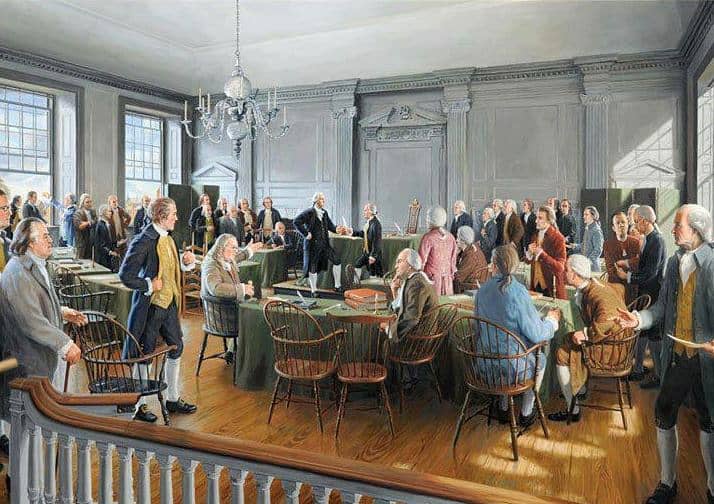Logic, these days, has been replaced in schools with a mind-control apparatus that involves the following:
EVERY POINT OF VIEW IS EQUAL.
EVERYBODY HAS TO CONTRIBUTE TO THE WHOLE.
TRUE CRITICAL THINKING, WHICH IS THE EXCLUSIVE TERRITORY OF THE INDIVIDUAL, LEAVES PEOPLE OUT OF THE GROUP AND IS THEREFORE PREJUDICIAL.
If you favor this new formulation and think it’s useful, I have condos on Jupiter for sale.
The point of modern education, more and more, is the GROUP.
“Good people belong to the group.”
“The Group is everything.”
“If you don’t belong to the Group, you have a mental disorder.”
Why is all this emphasis put on the Group?
The answer to that question also gives you the reason logic isn’t taught in schools anymore:
The independent self-sufficient individual is being phased out.
The independent individual who knows how to think and make lucid judgments on his own is a threat to the EMERGING RELIGION OF GLOBALISM.
The emerging religion of Globalism is a fuzzy image of THE GROUP.
The hive.
The colony.
The nest.
The planet.
Some people think education has been hijacked for the purpose of training children to become robotic workers for the State. That’s partly true, but education is also the proving ground for the religion of the Group.
This religion doesn’t need or want logic. Logic would be disruptive. It would differentiate one student from another. It would reveal there are ways to analyze information that actually come to valid conclusions. Logic isn’t fuzzy. It doesn’t promote the all-inclusive hive.
A year ago, I spoke to a teacher who was introducing his class to logic. He told me, “These are very bright kids. They’re all going to college. They said they couldn’t learn logic. They couldn’t do it. They had some kind of mental block.”
As we talked further, it became obvious that the mental block was an idea of THE GROUP. These kids had already been indoctrinated into “cooperative thought.” They instinctively realized that, if they studied logic, the Group would break apart. Each student would have to stand on his own, and that prospect was frightening.
In the religion of the Group, one of the key concepts is “the sustainability of the planet,” a catchphrase which is the leading edge of a vast movement to decide how the individual, as a UNIT, an energy-consuming UNIT, will be regulated in the overall scheme of things.
The individual’s life will be ruled by decisions of the “wise ones,” who understand how to distribute all the available resources of the planet.
I’ve actually had students tell me, in their fumbling way, that they have an obligation to think like everyone else. Or if they’re rebels, they have a duty to rebel like other rebels.
Logic is a sword that cuts through all that. It wakes up the sleeping mind. It doesn’t paint vague pictures. It has nothing to do with what the Group thinks or has been taught to think.
Logic isn’t a cooperative enterprise. That’s why it was exiled from school systems a long time ago.
I’ve talked to many teachers (I used to teach school) who tell me they lead their students on this basis: “we’re all in this together.”
It sounds nice, but it has nothing to do with education. It’s a con. It’s a way of avoiding teaching. Once a teacher walks down that road, he’s finished. He’s regressing back to being a child. He’s forfeiting his position. He’s involved in socializing. It can work for a picnic but not for school.
The cooperative spirit in the classroom is the prelude to the religion of the Group. “We’re all in this together” is the initial sales pitch.
I remember, 40 years ago, I had an argument with a teacher who was very annoyed that I was attacking the “spirit of the group” concept. He was absolutely convinced that the atmosphere he promoted in his classroom was instrumental in making education work. He was deeply offended that I was questioning it. For him, it was inconceivable that I couldn’t see the value of “sharing and caring” in the classroom. Hadn’t I ever played sports? Didn’t I know what a team was? Hadn’t I ever experienced the joy of friendship in a group?
I told him many of his kids were scoring quite badly in exams.
Apparently, this was beside the point. He was heroic, he was a good guy, he was a cheerleader for friendship and tolerance, he was concerned about feelings and self-esteem, he was doing his best to make good human beings out of his kids.
I knew all his moves. I had seen them before.
They didn’t make a dent, because in my college days the most compassionate professor I’d had taught me logic. He was also the most exacting professor. He put his students through the mill, and it was exciting. And when, years later, I started working as a reporter, I was already ahead of the game.
A person either wants to think for himself—and knows how to—or he prefers the hazy hive-like existence of belonging to something that is less than he is.
It’s that simple.
Logic gives you the option of making the first choice and avoiding the second.
I finished my formal education just before the really big group-wave hit. The educrats and the elite planners were putting the finishing touches on their blueprint for “participatory education.”
Under that system, the students would be encouraged to believe their random ideas and feelings were just as important as their teachers’. By extension, the students were really in class to make their feelings known and help lead the way to a more just world.
Learning would be done through osmosis, the result of the students and teachers rubbing off on each other. “It’s a process.”
Slice that baloney any way you want to, it’s still baloney. And when the meal is over, the students have no knowledge of logic, which is the foundation for rational thought. They’re cut loose on a river with no paddle. They have an inflated sense of self-worth, and no understanding to back it up.
Out in the world, after school is behind them, what do you think these graduates are going to be attracted to? Anything and anyone who sounds like he’s talking about the GROUP, who praises and elevates the GROUP, who promotes the Collective, who emphasizes how we’re all in this together for a better world.
Only it isn’t a better world. It isn’t, because these half-educated young adults never became truly independent individuals. And because “better world” is the flag behind which sits the actual scenario: self-appointed elite priests directing the distribution of all resources from Central Planning.
Eventually, these ex-students complain, “We didn’t think we were signing up for this!”
Small correction: you didn’t really think at all, because you never learned how.
Since logic is no longer taught as a required subject in schools, the door is open to all sorts of bizarre reactions to the presence of information.
Here are three favorites:
One: grab the title of an article, make up your mind about how you “feel,” and ignore everything else.
Two: Actually read the article until you find a piece of information that appeals to you for any reason; latch on to it, and run with it in any direction. In all cases, the direction will have nothing to do with the intent of the article.
Three: From the moment you begin to read the headline of the article, be in a state of “free association.” Take any word or sentence and connect it to an arbitrary thought or feeling, associate that thought with yet another arbitrary thought…and keep going until you become tired or bored.
You might be surprised at how many people use these three “methods of analysis.”
The very idea that the author of the article is making a central point doesn’t register. And certainly, the notion that the author is providing evidence for the central point is alien.
A college liberal education? These days it could be imparted in a matter of weeks, simply by hammering a small set of values into students’ skulls—along with requisite guilt and fear at the prospect of wandering off the reservation.
Logic as a subject is viewed with grave suspicion, as if it might involuntarily take a person down the wrong track and dump him in a politically incorrect ditch—a fate to be avoided at all costs.
Therefore, the practice of rational debate is out. Too risky. Besides, the preferred method of dealing with opponents is screaming at them, shoving them off stage, and whining about “being triggered.”
If you think obtaining what’s called a liberal college education is vastly overrated (and absurdly expensive), you’re right. Learning logic, instead, would be a good start down a different road.
And an analysis of the principle of “greatest good for the greatest number” would be very, very useful—since it underpins so much of values-centered education these days.
What does greatest good mean, specifically? How would it be achieved? Who would implement it? How would the implementation affect individual freedom?
Wrestling with these questions would open up whole new territories of insight.
As I’ve mentioned in past articles, when I taught a few basics of logic to middle-school students, the clutter in their minds receded. They found the ability to follow a line of thought. For the first time, they recognized there was such a thing as a connected flow of reasoning from A to B to C to D. The lights went on.
The world may be sinking into deeper levels of know-nothing non-rationality, but that’s not a good excuse for trailing along down into the swamp. It should be a wake-up call to go the other way.
No matter what anyone says, it’s not a crime to be smarter than other people.
Logic is a set of tools. The more a student uses and sharpens them, the more alert, acute, and independent he becomes. The less he relies on any group.
And eventually he doesn’t mind not relying on the group. He enjoys his independence.
He feels comfortable and confident in it.
As he should.
Several years ago, I came across a letter to the editor of Commentary Magazine, from its January 1979 issue. The author was a Jefferson scholar, Wilbur Samuel Howell.
Howell made several key points. As a college student, Jefferson studied philosophy and logic under Professor William Small, at William and Mary. Small had come to the college from Aberdeen, Scotland, where he had studied under William Duncan, a renowned logician and author of Elements of Logick. Indeed, Jefferson later remarked that Professor Small gone a long a long way toward shaping his life.
Therefore, it’s no surprise that the Declaration of Independence would adhere to a logical structure. Indeed, the Declaration is a kind of argument from first premises, through to a conclusion.
I went back and read the Declaration, and I’ll open up its logical structure.
It begins with this:
“When, in the course of human events, it becomes necessary for one people to dissolve the political bands which have connected them with another, and to assume among the powers of the earth, the separate and equal station to which the laws of nature and of nature’s God entitle them, a decent respect to the opinions of mankind requires that they should declare the causes which impel them to the separation.”
Jefferson, in this prologue, indicates that the people should state their reasons for separating from a ruling power. Before he goes on to do that, he enunciates his first premises.
All men have rights, and to secure them, they create governments.
Second, the people have the authority to abolish any ruler that tries to destroy those rights, and, in its place, the people should institute a new government.
Third, when a long history of tyrannical abuse proves that the old government cannot be corrected, the people have a duty to overthrow it.
Here is the text:
“We hold these truths to be self-evident, that all men are created equal, that they are endowed by their Creator with certain unalienable rights, that among these are life, liberty and the pursuit of happiness. That to secure these rights, governments are instituted among men, deriving their just powers from the consent of the governed. That whenever any form of government becomes destructive to these ends, it is the right of the people to alter or to abolish it, and to institute new government, laying its foundation on such principles and organizing its powers in such form, as to them shall seem most likely to effect their safety and happiness. Prudence, indeed, will dictate that governments long established should not be changed for light and transient causes; and accordingly all experience hath shown that mankind are more disposed to suffer, while evils are sufferable, than to right themselves by abolishing the forms to which they are accustomed. But when a long train of abuses and usurpations, pursuing invariably the same object evinces a design to reduce them under absolute despotism, it is their right, it is their duty, to throw off such government, and to provide new guards for their future security. –Such has been the patient sufferance of these colonies; and such is now the necessity which constrains them to alter their former systems of government. The history of the present King of Great Britain is a history of repeated injuries and usurpations, all having in direct object the establishment of an absolute tyranny over these states. To prove this, let facts be submitted to a candid world.”
What remains is for Jefferson to list the abuses of the British Crown; to prove, in other words, that the King has, in fact, brought on such a stream of tyrannical actions.
Well, here are the abuses:
“He has refused his assent to laws, the most wholesome and necessary for the public good.
“He has forbidden his governors to pass laws of immediate and pressing importance, unless suspended in their operation till his assent should be obtained; and when so suspended, he has utterly neglected to attend to them.
“He has refused to pass other laws for the accommodation of large districts of people, unless those people would relinquish the right of representation in the legislature, a right inestimable to them and formidable to tyrants only.
“He has called together legislative bodies at places unusual, uncomfortable, and distant from the depository of their public records, for the sole purpose of fatiguing them into compliance with his measures.
“He has dissolved representative houses repeatedly, for opposing with manly firmness his invasions on the rights of the people.
“He has refused for a long time, after such dissolutions, to cause others to be elected; whereby the legislative powers, incapable of annihilation, have returned to the people at large for their exercise; the state remaining in the meantime exposed to all the dangers of invasion from without, and convulsions within.
“He has endeavored to prevent the population of these states; for that purpose obstructing the laws for naturalization of foreigners; refusing to pass others to encourage their migration hither, and raising the conditions of new appropriations of lands.
“He has obstructed the administration of justice, by refusing his assent to laws for establishing judiciary powers.
“He has made judges dependent on his will alone, for the tenure of their offices, and the amount and payment of their salaries.
“He has erected a multitude of new offices, and sent hither swarms of officers to harass our people, and eat out their substance.
“He has kept among us, in times of peace, standing armies without the consent of our legislature.
“He has affected to render the military independent of and superior to civil power.
“He has combined with others to subject us to a jurisdiction foreign to our constitution, and unacknowledged by our laws; giving his assent to their acts of pretended legislation:
“For quartering large bodies of armed troops among us:
“For protecting them, by mock trial, from punishment for any murders which they should commit on the inhabitants of these states:
“For cutting off our trade with all parts of the world:
“For imposing taxes on us without our consent:
“For depriving us in many cases, of the benefits of trial by jury:
“For transporting us beyond seas to be tried for pretended offenses:
“For abolishing the free system of English laws in a neighboring province, establishing therein an arbitrary government, and enlarging its boundaries so as to render it at once an example and fit instrument for introducing the same absolute rule in these colonies:
“For taking away our charters, abolishing our most valuable laws, and altering fundamentally the forms of our governments:
“For suspending our own legislatures, and declaring themselves invested with power to legislate for us in all cases whatsoever.
“He has abdicated government here, by declaring us out of his protection and waging war against us.
“He has plundered our seas, ravaged our coasts, burned our towns, and destroyed the lives of our people.
“He is at this time transporting large armies of foreign mercenaries to complete the works of death, desolation and tyranny, already begun with circumstances of cruelty and perfidy scarcely paralleled in the most barbarous ages, and totally unworthy the head of a civilized nation.
“He has constrained our fellow citizens taken captive on the high seas to bear arms against their country, to become the executioners of their friends and brethren, or to fall themselves by their hands.
“He has excited domestic insurrections amongst us, and has endeavored to bring on the inhabitants of our frontiers, the merciless Indian savages, whose known rule of warfare, is undistinguished destruction of all ages, sexes and conditions.”
At this point, Jefferson makes it clear that the colonists have tried, without success, to correct these tyrannical abuses through peaceful means. They are not acting in haste:
“In every stage of these oppressions we have petitioned for redress in the most humble terms: our repeated petitions have been answered only by repeated injury. A prince, whose character is thus marked by every act which may define a tyrant, is unfit to be the ruler of a free people.
“Nor have we been wanting in attention to our British brethren. We have warned them from time to time of attempts by their legislature to extend an unwarrantable jurisdiction over us. We have reminded them of the circumstances of our emigration and settlement here. We have appealed to their native justice and magnanimity, and we have conjured them by the ties of our common kindred to disavow these usurpations, which, would inevitably interrupt our connections and correspondence. They too have been deaf to the voice of justice and of consanguinity.”
Jefferson then announces his conclusion, based on the prologue, the original premises of his argument, and the examples he has cited to confirm that the heart of these premises is true:
“We, therefore, the representatives of the United States of America, in General Congress, assembled, appealing to the Supreme Judge of the world for the rectitude of our intentions, do, in the name, and by the authority of the good people of these colonies, solemnly publish and declare, that these united colonies are, and of right ought to be free and independent states; that they are absolved from all allegiance to the British Crown, and that all political connection between them and the state of Great Britain, is and ought to be totally dissolved; and that as free and independent states, they have full power to levy war, conclude peace, contract alliances, establish commerce, and to do all other acts and things which independent states may of right do. And for the support of this declaration, with a firm reliance on the protection of Divine Providence, we mutually pledge to each other our lives, our fortunes and our sacred honor.”
—Fire, passion, even poetry, held within the flow of a logical progression.
Jefferson was not only a devoted student of logic, he wanted to make the great case for freedom and independence by using its power.
In his mind, freedom and logic were connected.
If in our schools, in 2017, logic as a distinct subject has been reduced to paltry terms, how are students able to grasp the majestic nature of freedom, as expressed in the Declaration? How are they able to understand that living in freedom is more than vaguely drifting from one slogan to another, one addled piece of political rhetoric to another?
Note: James Madison, thought of by many as the father of the Constitution, studied logic intensely at the College of New Jersey. In fact, there are 122 pages of Madison’s own handwritten notes from the course. The course followed the pattern laid down in a famous 17th-century book, Logic or the Art of Thinking.





![Cells Without Walls… [aether-tech, false Gogs, & blue-ish space lasers…]](https://christianobserver.net/wp-content/uploads/2023/09/TTISTF2-150x150.jpg)




